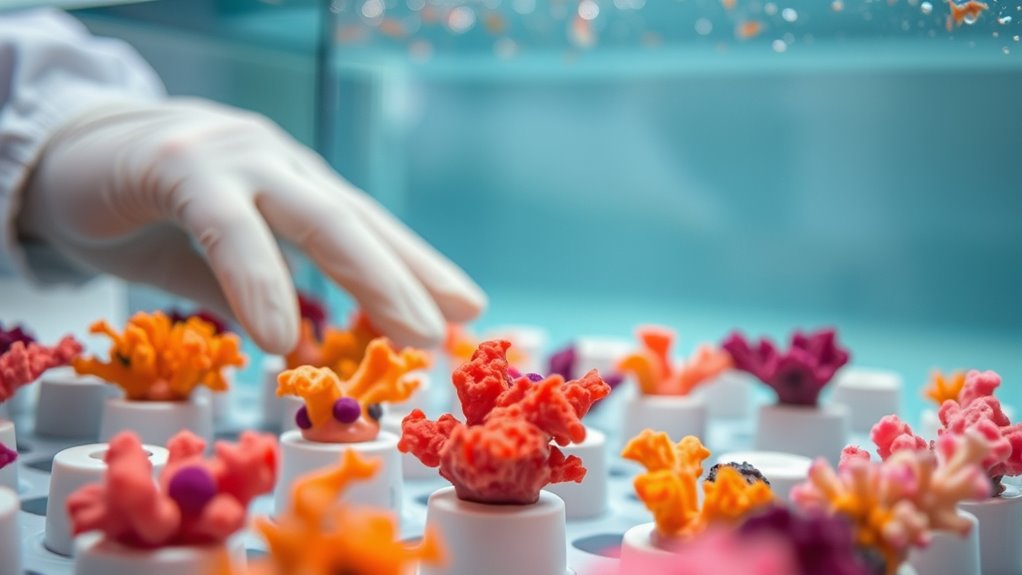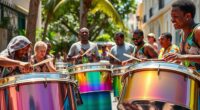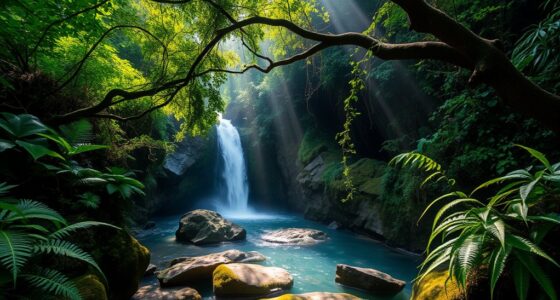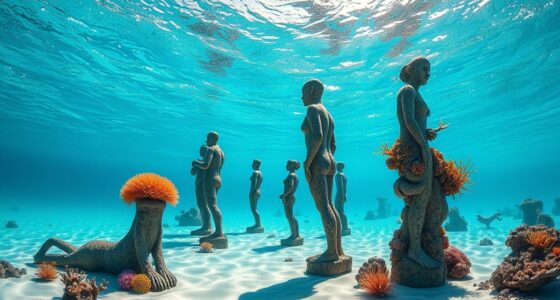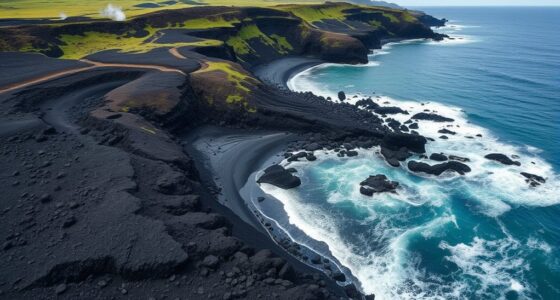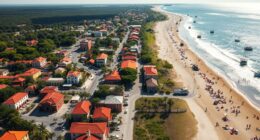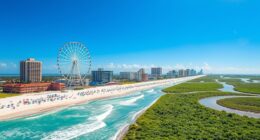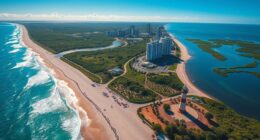Inside Bonaire’s reef restoration labs, you’ll see how local communities and scientists work together to grow and transplant healthy corals. They collect coral fragments and cultivate them on eco-friendly substrates, helping damaged reefs recover and become vibrant again. The labs also teach about reef ecology, including interactions with algae, fish, and environmental factors. If you keep exploring, you’ll discover how these efforts support long-term reef health and resilience.
Key Takeaways
- Bonaire’s reef restoration labs showcase coral propagation techniques using eco-friendly substrates in controlled environments.
- Local communities and volunteers actively participate in coral gardening efforts to support reef recovery.
- Labs study reef ecology, including algae competition and fish roles, to ensure successful coral transplantation.
- Ecological principles guide long-term reef stability and resilience through integrated restoration practices.
- Educational programs at the labs demonstrate coral gardening methods, fostering community awareness and involvement.
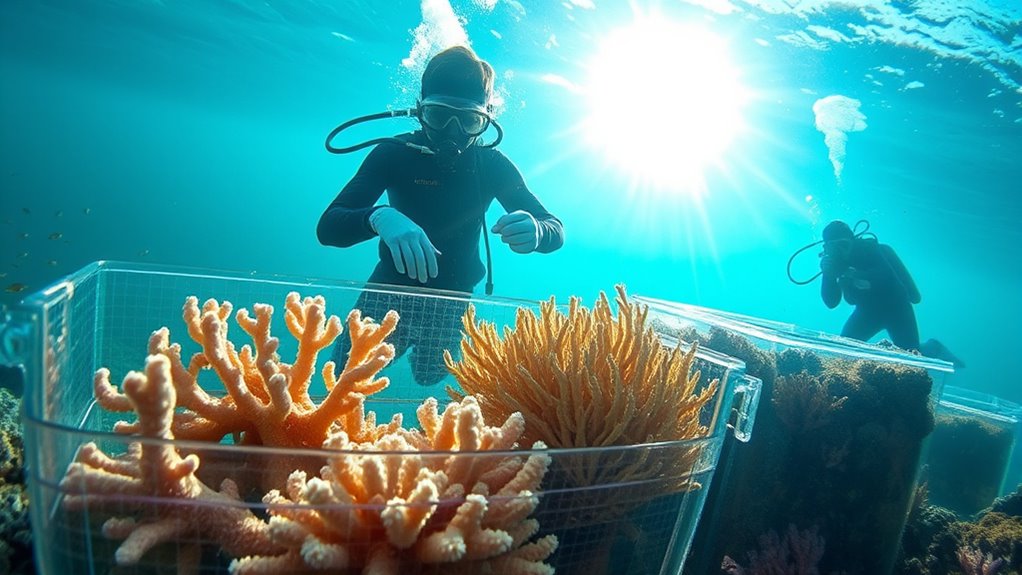
Bonaire has become a leading destination for coral gardening, where local communities and environmentalists work together to restore its vibrant reefs. At the heart of these efforts is coral propagation, a process that involves cultivating new corals to replenish damaged or degraded reef areas. This initiative isn’t just about growing coral; it’s about understanding and supporting reef ecology—the complex relationships between corals, algae, fish, and other marine life that sustain healthy reefs. As you explore Bonaire’s reef restoration labs, you’ll see firsthand how these efforts are transforming the underwater landscape and ensuring the longevity of marine ecosystems.
Bonaire leads coral gardening efforts, restoring reefs through community-driven coral propagation and ecological understanding.
In these labs, scientists and volunteers carefully collect fragments of healthy corals, which are then propagated in controlled environments. You’ll observe how they attach small coral pieces to specially designed substrates—often made from eco-friendly materials—that mimic the natural reef surface. This method allows corals to grow in ideal conditions before being carefully transplanted back onto the reef. By focusing on coral propagation, the team accelerates reef recovery, helping to restore the intricate balance that supports diverse marine species. The process isn’t quick, but each healthy coral colony becomes a crucial part of the larger reef ecology, contributing to habitat complexity and resilience.
Understanding reef ecology is essential to these restoration efforts. It’s not enough to just grow corals; you need to grasp how corals interact with other reef inhabitants. For instance, the labs often study how algae compete with corals for space, how fish and invertebrates contribute to nutrient cycling, and how environmental factors influence coral health. This knowledge guides the restoration process, ensuring that the transplanted corals integrate seamlessly into their environment and promote a thriving, balanced reef system. Additionally, integrating ecological principles into coral gardening enhances the chances of long-term success and ecosystem stability. As you witness the work firsthand, it becomes clear that successful coral gardening hinges on more than just planting corals—it’s about restoring the entire ecological framework.
Bonaire’s approach to reef restoration emphasizes community involvement, combining scientific expertise with local knowledge. Volunteers get hands-on experience in coral propagation, learning techniques that maximize survival rates and ecological compatibility. This collaborative effort fosters a sense of ownership and responsibility among residents and visitors alike, making reef conservation a shared goal. Ultimately, these labs serve as living classrooms where you can see how targeted coral gardening efforts directly contribute to healthier reefs, ensuring that Bonaire’s vibrant underwater world endures for generations to come.
Frequently Asked Questions
How Long Does It Take for Corals to Mature in the Lab?
You might wonder how long it takes for corals to mature in the lab. Coral growth rates vary, but generally, lab maturation timelines range from several months to over a year, depending on the species and conditions. During this period, corals develop from tiny larvae to sizable, healthy colonies ready for transplantation. Patience is key, as this nurturing process guarantees they’re strong enough to thrive once reintroduced into the reef environment.
Are Coral Gardening Techniques Suitable for All Reef Species?
You might wonder if coral gardening techniques suit all reef species. The answer depends on species adaptability and environmental suitability. Some species thrive better in specific conditions, making them more suitable for restoration efforts. You should consider local environmental factors and the resilience of each species. While many corals can be cultivated successfully, it is crucial to match the species with the environment to guarantee their survival and growth.
What Are the Main Challenges Faced in Bonaire’s Reef Restoration?
Oh, the joys of reef restoration—climate change and pollution mitigation, anyone? In Bonaire, you face the challenge of battling rising sea temperatures that threaten coral survival and combating pollution that stains the ocean’s beauty. You must balance restoring delicate ecosystems while tackling global issues beyond your control. It’s a tough gig, but with dedication, you can help reefs bounce back from the brink of disaster.
Can Tourists Participate in Coral Gardening Activities?
You can definitely participate in coral gardening activities during your Bonaire visit. Many programs offer volunteer opportunities where you help restore the reef firsthand. You might also join educational workshops to learn about coral propagation and reef conservation. These experiences let you actively contribute to reef health while gaining valuable knowledge, making your trip more meaningful. Just check with local organizations for schedules and participation requirements.
How Do Laboratory-Grown Corals Compare to Wild Corals?
You might wonder if lab-grown corals match wild ones, and the answer is complex. While lab corals benefit from controlled growth and improved resilience, they often have less genetic diversity, which can impact their adaptability. Growth rates are usually faster in labs due to optimized conditions, but wild corals possess natural genetic variety that fosters survival in unpredictable environments. Both play essential roles in reef restoration’s future.
Conclusion
By participating in Bonaire’s coral gardening efforts, you help restore vibrant reefs and support marine life. Imagine a future where your efforts help a fragile coral fragment grow into a thriving reef, providing shelter for countless species. For example, a recent project saw a small nursery produce enough coral to reestablish a degraded area, transforming it into a bustling marine habitat. Your involvement can make a real difference—helping reefs recover and flourish for generations to come.

